After much soul-searching, a deep YES resounded in my soul to return to Africa to spend last January in Uganda and February in South Africa. I embraced the trip as one of mutual exchange and part of the work of Glob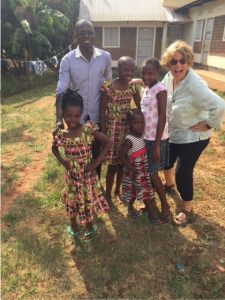 al Citizen Journey. I learned so much, formed treasured relationships and was gratified to find that the work of my heart, Compassionate Listening, was fully embraced and richly received. I want to share the struggles I encountered with my decision to go, along with some of the rich harvest of learning I gleaned.
al Citizen Journey. I learned so much, formed treasured relationships and was gratified to find that the work of my heart, Compassionate Listening, was fully embraced and richly received. I want to share the struggles I encountered with my decision to go, along with some of the rich harvest of learning I gleaned.
When my friend, Bernard Omuse, Director of the wonderful UMOP (Uganda Martyrs Orphanage Project) and his brother, Father Centurio Olaboro, the Justice and Peace Coordinator for the Tororo Archdiocese, began urging me to come, I found the temptation irresistible. The pull was intensified when I learned about the Abayudaya Jews of Uganda. As a fellow Jew, how extraordinary it would be to attend services in a synagogue there! Still, I felt uneasy: how would such a trip align with my dedication to the greater good for all life on our precious planet as well as my concerns about the pollution generated by airplanes? Why go to foreign lands when there is so much need right here in my own community? Indeed, I continue to question, struggle and ask myself, why travel? Why am I so inextricably pulled to engage with other cultures? And why Africa?
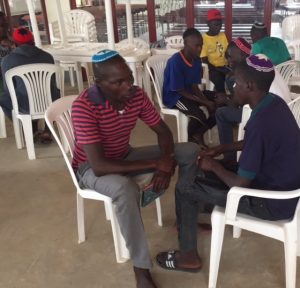 I recall the pain I felt around the enormity of the gap between the material realities of my world and Africa as well as the endless and unfathomable needs I witnessed in Nigeria (2005), Ghana (2006), and Liberia (2009-10). What would I have to offer? Have I fallen prey to the pitfalls of being a “do-gooder” or been blinded by feel-good impulses? Am I sensitive to the complexities of racism, classism and power? Am I aware enough to fully respect, trust and defer to the wisdom of each community to know the best way to meet their own challenges?
I recall the pain I felt around the enormity of the gap between the material realities of my world and Africa as well as the endless and unfathomable needs I witnessed in Nigeria (2005), Ghana (2006), and Liberia (2009-10). What would I have to offer? Have I fallen prey to the pitfalls of being a “do-gooder” or been blinded by feel-good impulses? Am I sensitive to the complexities of racism, classism and power? Am I aware enough to fully respect, trust and defer to the wisdom of each community to know the best way to meet their own challenges?
As I peeled through these layers, I came to understand that, at my core, I am a global citizen. The pull I feel arises from a deep sense of life’s interconnectedness and my inter-beingness, along with a yearning to be as fully “woke” as I can be. Like a fish swimming in the polluted waters of my culture, I need to recognize the toxins to survive. An essential way to begin to notice and cleanse some of the bias and toxicity is through experiencing other worlds, other waters.
I am buoyed by the powerful words of Lilla Watson, Aboriginal elder, activist and educator from Queensland, Australia: “If you have come to help me, you are wasting your time. If you have come because your liberation is bound up with mine, then let us work together.”
Some of the liberating lessons I learned (and re-learned):
- Chill out! Trust and allow time and events to flow in an organic, non-linear and polychronous rhythm. I felt so alive, present and relaxed after weeks of living in Uganda but once I was back in the US I soon felt boxed in and compelled to live by the clock and calendar. Who knows where I want to be next Thursday at 10:30 a.m.? The whole world could change by then! Yet my western mind wants to plan, control, predict. Sure, my Uganda workshops were always way off schedule. But in the raggedy start times, there was the opportunity to schmooze, connect and feel the aliveness of recreating in the moment; to dance with what was happening.
- Notice and Appreciate! There are countless webs of infrastructure that coddle my daily life in the USA. Paved roads without dust. Taxis and Uber so you’re not stuck without transportation. GPS that will guide your way. Traffic signals that help the flow of traffic. Tow trucks/AAA service and ambulances you can call. Trustworthy medical facilities. Access to water without walking and hauling. Hot water at the turn of a tap. Access to soccer balls and fields that don’t chew them up with sharp rocks. Insurance to help support repairs to home, vehicle or health. Plentiful books written in my native language. Libraries. Movie theatres. Free access to WiFi. Life is a conversation and a dance. You can never find your way to a destination without talking to many people along the way for directions. Folks stop in just to visit – there’s always a way to hang out and make time and space to enjoy the unexpected. And, somehow, despite the poverty, there’s always enough food to share for a meal.
Some of the gifts I exchanged: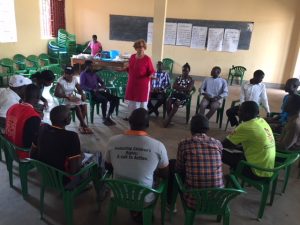
- Presence: seeing, hearing, loving: Again and again I was told how much just my coming there meant to people, especially in the remote places I visited. The experience of interconnectedness is, of course, two–way!
- Compassionate Listening: Initially, I felt extremely trepidatious and unsure. The settings were diverse – a cavernous assembly hall at UMOP; a circle of hand-hewn tiny benches and mats in remote villages; a beautiful new synagogue social hall; the courtyard of a convent; the corner of a dark, unlit, musty boys’ dorm. Was it appropriate for me, a white woman from the West, with relatively enormous privilege, to come to offer anything? While I continue to wrestle with this issue, what I learned in these varied circles was the universality of the longings and suffering in our human hearts; our resilience and capacity for compassion; and the need for self-care. I wasn’t so much teaching as I was opening the space, providing for an experience.
- Tools to be a Better Fisher! We’ve all heard the expression: “Give a man a fish, and you feed him for a day; Teach a man to fish, and you feed him for a lifetime.” By the end of this journey, I came to understand that by sharing Compassionate Listening, I was sharing the tools to be a more resilient, patient and effective fisher. After the listening exercises, participants said they felt much lighter – not so alone or burdened. They felt greatly comforted by the meditation on self-compassion and self-care. Just sitting in silence, with eyes closed, was a powerful new experience. Many expressed delight and relief at having these tools to manage stress, frustration and anger.
- Reflection and Planning are Luxuries: In the milling exercises we did (walk around at random, stop and find a partner at the ring of the bell), they were often moved to joy, surprise and pride in response to the simple questions such as: “What were you most proud of last year?”; “What was your biggest challenge?”; “What is your hope or dream for this coming year?” In the intense struggle to get through each day, they’d never taken the time or had the inclination to pause, reflect on the past, or dream into the future. Stepping out of the present moment was a luxury provided in the circle gathering I offered. On the other side, here in the States, I find we struggle to fully step into the present moment.
Here are some testimonials from participants that I received two months after the sessions:
“Thanks, Susan. From the lessons you taught, I learned to listen and talk to myself before doing any responding.” – Israel, Leader in Nagoya Hill
“I notice taking some time and listening to myself, take a breath and feel the surrounding. Learning to take myself as if I am somebody else has been my great lesson.” – Yoash, Founder of Tikkon Olam school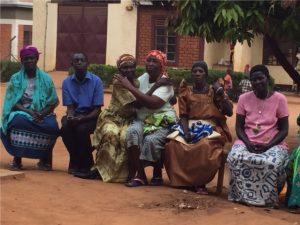
“It has helped me manage the many stresses and crises of my work. I breathe in and breathe out and that helps.” — Bernard, UMOP Director
“The training works! So glad for the knowledge and skills you taught me, for real. My pupils now enjoy my lessons because I listen to them often. They really like me and trust me now. I am dedicating an hour for each class once a week where I take the kids outside. I put them one with one, in pairs, and they take turns listening to each other under the big mango tree. They feel so happy after. They say ‘Oh, everything will be ok.’ They come back to the classroom very calm.” — Irene, UMOP Jr. High Head Teacher
Some struggles I am left with:
- What about financial giving? There are such enormous immediate needs for “fish.” UMOP is struggling this year because of the government’s recent decision to stop funding any non-governmental schools – even though UMOP is clearly a charitable nonprofit that serves the needs of nearly 1000 orphaned and poor children. Many more could attend school if they received scholarships. And now a storm blew the roof off the teachers’ quarters. Of course, there is no insurance or FEMA to help out.
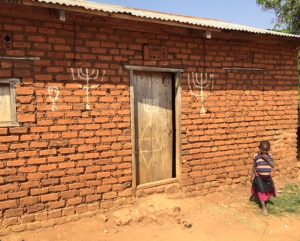
- Almost daily, I receive messages from friends and contacts made there with requests for the Seder (special Jewish ritual); jobs in the US; scholarships in the US; school tuition; computers; medical bills; house repairs.
- What is mine to do? What are my boundaries? How does this stir in me my own fears about having “enough,” financial insecurity in my retirement years, self-judgments around greed and lack of generosity?
I’ll close with a 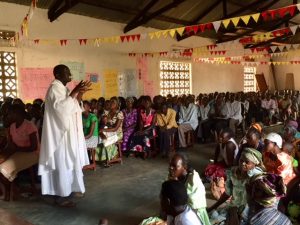 story about a visit to a small village church. As soon as we drove up, my heart cracked open at the sound of the joyful spirit arising from the dancing, praying and singing peppered with the electrifying ululations of the women. After the service, what a thrill and privilege they offered me, blessing me with a local name: Akolong – season of the sun, brightness, light. But then in the midst of the joy a challenge raised its ugly head, the local pastor leaned over to say, “Well, now we hope you will come back to help us build and complete our church.”
story about a visit to a small village church. As soon as we drove up, my heart cracked open at the sound of the joyful spirit arising from the dancing, praying and singing peppered with the electrifying ululations of the women. After the service, what a thrill and privilege they offered me, blessing me with a local name: Akolong – season of the sun, brightness, light. But then in the midst of the joy a challenge raised its ugly head, the local pastor leaned over to say, “Well, now we hope you will come back to help us build and complete our church.”
Yikes! My heart sank and contracted. What expectations had I unwittingly generated? I stuttered, “I’m so sorry, I can’t make any such promise.”
Fortunately, Father Centurio covered for me, saying that now that I was part of the community, I might want to help, so if there is a need for a chair, I would help bring a chair.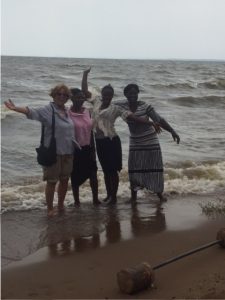
So I end as I began, with soul-searching around this unavoidable chasm that makes it painful to come to Africa: the inevitability of being seen as a big dollar sign. The vast gulf between our worlds, excruciatingly and lethally inequitable. I understand that when I, a white westerner, show up in Africa, I am seen as a potential resource and last hope. I understand that each person I connect with is praying I’ll be their lifeline. It is overwhelming. The needs are vast and unending.
I ponder: Should I stop meeting people and visiting communities so there are no expectations? How does one live with integrity in a broken world?
In sorting through this, I recall Joanna Macy’s identification of three key modes of working towards The Great Turning (from Destructive Industrial Growth to a Life-Sustaining Society): 1) Holding Actions: buy time, save lives, minimize damage; 2) Transform the Foundations of our Common Life: study and work toward systemic change; and 3) Shift in Perceptions and Values: for cognitive revolution and spiritual awakening. They are all valid and needed. I am called to the third. I believe sharing the practices of Compassionate Listening prepares us for this shift.
Looking back on this extraordinary trip, I believe my new connections have brought more love and light to the world. I accept the discomfort and the pain. It is a worthy struggle to wrestle with these issues, the soul-searching is what makes the journey a transformative one and helps show the way to clear waters.
– Susan Partnow

GCJ is a Fiscal Sponsor of Healthy Lesotho
Healthy People, Healthy Land
Healthy Lesotho works with local partners on improving the lives and land of the Kingdom of Lesotho, an independent country situated within South Africa. Click here for more information.
Upcoming Trip News – Guatemala
Global Citizen Journey is currently planning to travel to Guatemala, “Land of Eternal Spring,” in the fall of 2026 in partnership with Taa’ Pi’t. Located in San Pedro La Laguna on the southwest shore of Lake Atitlán, the efforts of CIE Taa’ Pi’t aim to improve children’s education, preserve the Tz’utujil Maya culture, promote ecological conservation, and encourage sustainable practices. A holistic approach, respecting the perspectives of all communities and valuing Maya cultural practices of sustainable management, is essential for preserving the “mother earth” and “mother lake Atitlán” as sources of health and well -being for future generations.
Stay tuned for news of Global Citizen Journey’s next adventure to Guatemala.
Upcoming Trip News – Uganda postponed
Global Citizen Journey had planned to travel to Uganda, ‘The Pearl of East Africa,’ in partnership with Uganda Martyr’s Orphanage Project in Tororo. The November 2020 trip has been postponed indefinitely due to the pandemic and now the ensuing hardships being experienced there. Food shortages, spiraling inflation and a host of political complications combine to put tremendous stress on our friends and colleagues there. We hope we will some day be able to join 12 North Americans with 12 Ugandans to live, eat and dialogue with one another while we engage with the local community and the children, as well as help launch a health centre that cares for UMOP students and community members. We will also meet with the Jewish Abayudaya community. (An optional post-delegation safari will be offered.)
Stay tuned for news of Global Citizen Journey’s next adventure to Uganda, Africa!
Lessons From a Global Citizen’s Journey to Uganda
After much soul-searching, a deep YES resounded in my soul to return to Africa to spend last January in Uganda and February in South Africa. I embraced the trip as one of mutual exchange and part of the work of Glob al Citizen Journey. I learned so much, formed treasured relationships and was gratified to find that the work of my heart, Compassionate Listening, was fully embraced and richly received. I want to share the struggles I encountered with my decision to go, along with some of the rich harvest of learning I gleaned.
al Citizen Journey. I learned so much, formed treasured relationships and was gratified to find that the work of my heart, Compassionate Listening, was fully embraced and richly received. I want to share the struggles I encountered with my decision to go, along with some of the rich harvest of learning I gleaned.
When my friend, Bernard Omuse, Director of the wonderful UMOP (Uganda Martyrs Orphanage Project) and his brother, Father Centurio Olaboro, the Justice and Peace Coordinator for the Tororo Archdiocese, began urging me to come, I found the temptation irresistible. The pull was intensified when I learned about the Abayudaya Jews of Uganda. As a fellow Jew, how extraordinary it would be to attend services in a synagogue there! Still, I felt uneasy: how would such a trip align with my dedication to the greater good for all life on our precious planet as well as my concerns about the pollution generated by airplanes? Why go to foreign lands when there is so much need right here in my own community? Indeed, I continue to question, struggle and ask myself, why travel? Why am I so inextricably pulled to engage with other cultures? And why Africa?
As I peeled through these layers, I came to understand that, at my core, I am a global citizen. The pull I feel arises from a deep sense of life’s interconnectedness and my inter-beingness, along with a yearning to be as fully “woke” as I can be. Like a fish swimming in the polluted waters of my culture, I need to recognize the toxins to survive. An essential way to begin to notice and cleanse some of the bias and toxicity is through experiencing other worlds, other waters.
I am buoyed by the powerful words of Lilla Watson, Aboriginal elder, activist and educator from Queensland, Australia: “If you have come to help me, you are wasting your time. If you have come because your liberation is bound up with mine, then let us work together.”
Some of the liberating lessons I learned (and re-learned):
Some of the gifts I exchanged:
Here are some testimonials from participants that I received two months after the sessions:
“Thanks, Susan. From the lessons you taught, I learned to listen and talk to myself before doing any responding.” – Israel, Leader in Nagoya Hill
“I notice taking some time and listening to myself, take a breath and feel the surrounding. Learning to take myself as if I am somebody else has been my great lesson.” – Yoash, Founder of Tikkon Olam school
“It has helped me manage the many stresses and crises of my work. I breathe in and breathe out and that helps.” — Bernard, UMOP Director
“The training works! So glad for the knowledge and skills you taught me, for real. My pupils now enjoy my lessons because I listen to them often. They really like me and trust me now. I am dedicating an hour for each class once a week where I take the kids outside. I put them one with one, in pairs, and they take turns listening to each other under the big mango tree. They feel so happy after. They say ‘Oh, everything will be ok.’ They come back to the classroom very calm.” — Irene, UMOP Jr. High Head Teacher
Some struggles I am left with:
I’ll close with a story about a visit to a small village church. As soon as we drove up, my heart cracked open at the sound of the joyful spirit arising from the dancing, praying and singing peppered with the electrifying ululations of the women. After the service, what a thrill and privilege they offered me, blessing me with a local name: Akolong – season of the sun, brightness, light. But then in the midst of the joy a challenge raised its ugly head, the local pastor leaned over to say, “Well, now we hope you will come back to help us build and complete our church.”
story about a visit to a small village church. As soon as we drove up, my heart cracked open at the sound of the joyful spirit arising from the dancing, praying and singing peppered with the electrifying ululations of the women. After the service, what a thrill and privilege they offered me, blessing me with a local name: Akolong – season of the sun, brightness, light. But then in the midst of the joy a challenge raised its ugly head, the local pastor leaned over to say, “Well, now we hope you will come back to help us build and complete our church.”
Yikes! My heart sank and contracted. What expectations had I unwittingly generated? I stuttered, “I’m so sorry, I can’t make any such promise.”
Fortunately, Father Centurio covered for me, saying that now that I was part of the community, I might want to help, so if there is a need for a chair, I would help bring a chair.
So I end as I began, with soul-searching around this unavoidable chasm that makes it painful to come to Africa: the inevitability of being seen as a big dollar sign. The vast gulf between our worlds, excruciatingly and lethally inequitable. I understand that when I, a white westerner, show up in Africa, I am seen as a potential resource and last hope. I understand that each person I connect with is praying I’ll be their lifeline. It is overwhelming. The needs are vast and unending.
I ponder: Should I stop meeting people and visiting communities so there are no expectations? How does one live with integrity in a broken world?
In sorting through this, I recall Joanna Macy’s identification of three key modes of working towards The Great Turning (from Destructive Industrial Growth to a Life-Sustaining Society): 1) Holding Actions: buy time, save lives, minimize damage; 2) Transform the Foundations of our Common Life: study and work toward systemic change; and 3) Shift in Perceptions and Values: for cognitive revolution and spiritual awakening. They are all valid and needed. I am called to the third. I believe sharing the practices of Compassionate Listening prepares us for this shift.
Looking back on this extraordinary trip, I believe my new connections have brought more love and light to the world. I accept the discomfort and the pain. It is a worthy struggle to wrestle with these issues, the soul-searching is what makes the journey a transformative one and helps show the way to clear waters.
– Susan Partnow
GCJ is fiscal sponsor for Washington State Poor People’s Campaign
GCJ and ELFA International
Our wonderful nonprofit partner in India, Education and Livelihood For All International (ELFA International), recently shared these photos of notebooks, desks and other supplies bought for the impoverished school children in Kashmir with the help of donations collected by Global Citizen Journey (GCJ). A big thank you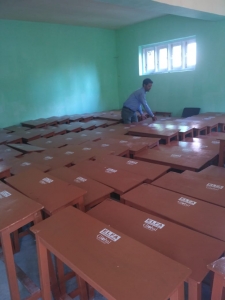 to ELFA for
to ELFA for 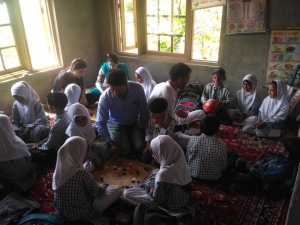 all the great work!
all the great work!
GCJ aims to build peaceful relations via citizen diplomacy and one way to do this is to recognize the problems plaguing our fellow global citizens.
If you wish to make a contribution to support public schools in Kashmir, please click here!
Donate
Join the GCJ Kashmir delegation September 26/18 – Next Intro: April 28, 2018
Global Citizen Journey is excited about the formation of our GCJ delegation to Kashmir this fall. We still have a few openings and are planning our next Information Session for April 28. There is lots of information up on the website. Feel free to contact co-director Irene Michon at imichon58@gmail.com if you want more details sooner than late April! We hope you are intrigued and will begin dreaming of Kashmir with us… The application for the journey is now available.
We are pleased to host this “Meet & Greet” session in Seattle on Saturday from 10:30 am to noon at the wonderful Couth Buzzard Books & Espresso Buono Cafe, (8310 Greenwood Ave N) for anyone interested in learning about Kashmir… and especially for those of you interested to participate in our Kashmir 2018 delegation!
GCJ delegates met many wonderful Kashmiris during their travels in India last spring and they implored us to visit Kashmir and assured us we would fall in love with their beautiful land. They were right! It is a beautiful place with snow-capped mountains, the gorgeous Dal Lake, rich culture and traditions… And deep pain. The complex and conflictual conditions in Kashmir seem tailor-made for our Global Citizen Journey (GCJ) model and in this time of Islamaphobia and increasing tensions amongst the various big powers on the planet, the time seems ripe. As global citizens, we will listen to the many sides of the issues there and we will bring stories of what we learned back to our home communities. Read more here: http://globalcitizenjourney.org/about-india/india-2018-kashmir-2/
For further details, please contact Susan Partnow at: susan@globalcitizenjourney.org
Follow us on Facebook for information on GCJ events, photos, and more!
News from Partners – Burundi
Global Citizen Journey (GCJ) visited Burundi in 2008, but certainly engagement with the community did not end. To this day, GCJ delegates are partnered with “Kazoza Kumukenyezi” which translates as “The woman’s future.” We have helped the Carama Widows Association purchase land to enable these inspiring women to support themselves and their families financially. Now they have a chance to expand their production and the number of families they can support, but they need to raise about $2,000 funds to purchase the additional land. To learn more about this amazing organization, visit their Facebook page or to donate to help with their next land purchase click here. Be sure to designate Carama Women when you donate! Read more about GCJ Burundi and our partnership with Kazoza Kumukenyezi here.
Upcoming Trip News Kashmir 2018
Saffron
Stay tuned for news of Global Citizen Journey’s next adventure to Kashmir, India!